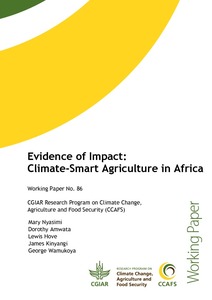Resource information
The vulnerability of Africa’s agriculture to climate change is complex. It is shaped by biophysical, economic, socio-cultural, geographical, ecological, institutional, technological and governance processes that interact in intricate ways, and can together reduce farmers’ adaptive capacity. Women farmers with few resources are particularly vulnerable. This working paper highlights the array of adaptation strategies that exist across Africa’s diverse farming systems and climatic conditions. These strategies can provide the impetus for transforming Africa’s agriculture. The case studies show how farmers are already adapting to climate change, what kinds of investment and how much is needed, and what local and national leadership is necessary to increase adoption and scale up. Successful case studies are broadly defined as those that identify, test and implement climate-smart agriculture (CSA) practices and institutions, counter the impacts of climate change and offer the highest returns on investments. These CSA practices offer the best chance of food security and many other benefits for the people of Africa in the long term.


